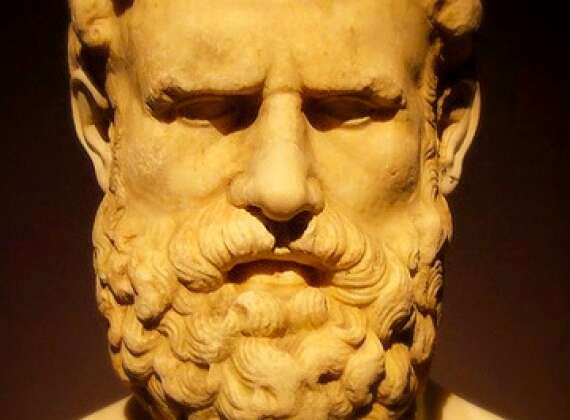
Archilochus is the earliest of the great European lyric poets—doubly so. He created various forms of poetry meant to be sung. His poetry expresses emotion; it is personal and it is also satirical. But his satire is not only personal, as in the verses addressed to his former lover Neobulé, who abandoned him. What he mocks is also the “ideal” life of his time, with its conventional values, and what he rejects is glory—the foremost value in the Homeric world.
Unlike Homer, Archilochus does not refer to a legendary past. He does not glorify heroism, nor does he speak of the gods. His poetry refuses myth. It is individualistic, expressing a longing for freedom and embracing the pleasures one may seek from life. His poetry is produced solely from the emotions of the individual. Among these emotions, the strongest are hatred and love. And of love, he speaks directly, without metaphor, unlike Homer: “With her hair drenched in perfume and her chest, she would have stirred desire in an old man.” Never before had romantic desire been expressed so boldly, stripped of all literary idealization or sentimental justification.
Archilochus was born in Paros in ancient times, when the island was a block of marble, a wealth hidden beneath a thin layer of earth. This wealth was not exploited until the 5th century BCE. Archilochus lived there in the 7th century BCE. His father, Telesicles, was a leader, but his mother was a slave. He was merely his father’s illegitimate son. Archilochus did not disown his servile blood. He was not ashamed of being, through his mother, a son of the people. This is a crucial fact that highlights the poet’s surprising freedom of mind.Through his father and grandfather, he was connected to the island of Thasos, which he set out to conquer in the more prosperous second part of his life.
At the time, Paros was a land of poverty, plagued by social conflict. The harsh social climate and the barren soil prompted the people of Paros to emigrate early on. Archilochus eventually did the same, leaving for Thasos: “Leave Paros, its wretched figs, and this life that must be wrested from the waves.” He became deeply involved there, defending new, emancipatory human values that opposed the feudal world of his time.
Today, Archilochus is celebrated in Paros and by its citizens. His name has been given to the island’s most important cultural association. Nikos Sarris, one of Paros’s most renowned intellectuals, set Archilochus’s poems to music. The music was released as an album and later performed at various cultural events.
Several books have been written on the subject, including one by Christos Yorgoussis, a professor, a poet and well-known community activist on the island. This book was published by the municipality during the term of Mayor Yannis Ragoussis and distributed to schoolchildren in 2005.
To conclude, let us give the floor to nobelist Odysseas Elytis:
“At a time when the religious foundations of society are still strict, when epic discourse holds a monopoly on expression, when the heroic element is the permanent and accepted value, an Archilochus and a Sappho in Lesbos overturn everything. They bring feelings and dreams to the forefront, dare to speak of their individual lives, express their sorrow, sing, dance—the first in the Aegean Sea, and the first in the known world. »

Leave a Reply